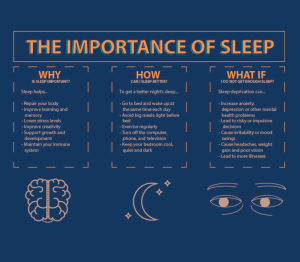Table of Contents
Role of Sleep is often overlooked in discussions about health and wellness, yet it plays a crucial role in our overall well-being. In today’s fast-paced world, where stress and anxiety are common, getting a good night’s rest is more important than ever. In this article, we’ll delve into the benefits of a good night’s sleep and explore its impact on our physical and mental health.
Understanding the Importance of Sleep

1. Restoring the Body
Sleep is essential for the body’s repair and restoration processes. During sleep, the body repairs tissues, muscles, and organs, allowing them to function optimally. Lack of sleep can impair these processes, leading to fatigue and a weakened immune system.
2. Cognitive Function
Sleep plays a vital role in cognitive function, including memory consolidation, learning, and problem-solving. A well-rested brain is more alert and better equipped to handle complex tasks and decision-making.
3. Emotional Well-being
Quality sleep is linked to emotional well-being and mental health. Adequate sleep can help regulate emotions and reduce the risk of mood disorders such as depression and anxiety.
The Role of Sleep on Physical Health
1. Weight Management
Sleep plays a role in regulating appetite and metabolism. Lack of sleep can disrupt these processes, leading to weight gain and an increased risk of obesity.
2. Heart Health
Quality sleep is essential for heart health. Poor sleep habits have been linked to an increased risk of heart disease, high blood pressure, and stroke.
3. Immune Function
Sleep is crucial for a healthy immune system. During sleep, the body produces cytokines, proteins that help fight infection and inflammation. Without adequate sleep, the immune system may be compromised, making it harder to fend off illness.
Tips for a Good Night’s Sleep
- Stick to a consistent sleep schedule, even on weekends.
- Create a relaxing bedtime routine to signal to your body that it’s time to wind down.
- Avoid screens (phones, tablets, computers) before bedtime, as the blue light can interfere with melatonin production.
- Make sure your sleep environment is comfortable, quiet, and dark.
FAQs
Q: How many hours of sleep do I need?
A: Most adults need 7-9 hours of sleep per night for optimal health.
Q: Can I catch up on missed sleep?
A: While you can repay a sleep debt to some extent, consistently getting enough sleep is best for overall health.
Conclusion, a good night’s sleep is essential for our physical, mental, and emotional well-being. By prioritizing sleep and adopting healthy sleep habits, we can improve our overall health and quality of life.














